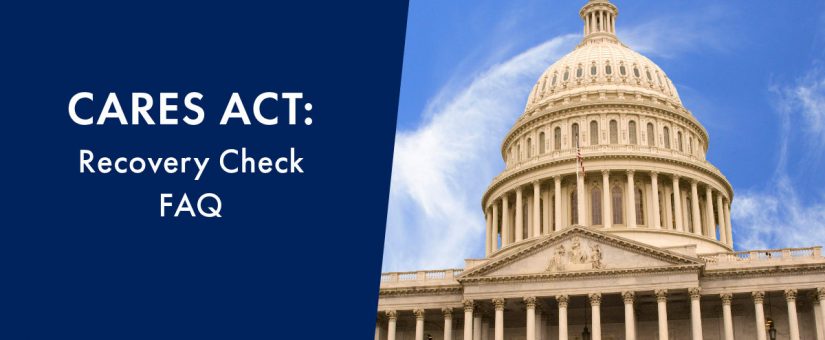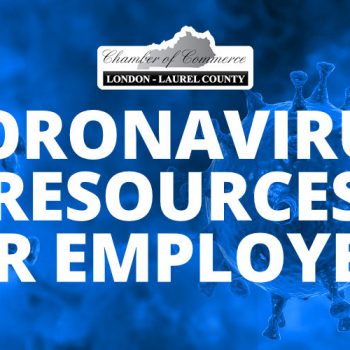
CARES Act: Recovery Check FAQ
We know that many of you have questions about the CARES Act and the recovery rebate. The Senate Finance Committee has prepared a FAQ that answers many common questions and provides helpful information about this new legislation.
FREQUENTLY ASKED QUESTIONS
Who is eligible for a recovery rebate? All U.S. residents with adjusted gross income under $75,000 ($112,500 for head of household and $150,000 married), who are not the dependent of another taxpayer and have a work-eligible Social Security Number, are eligible for the full $1,200 ($2,400 married) rebate. They are also eligible for an additional $500 per child. A typical family of four is eligible for a $3,400 recovery rebate.
What about taxpayers with adjusted gross income over $75,000 ($112,500 for head of household and $150,000 married)? Are they eligible to receive any rebate? The rebate amount is reduced by $5 for each $100 that a taxpayer’s income exceeds the phase-out threshold. The amount is completely phased-out for single filers with incomes exceeding $99,000, $146,500 for head of household filers with one child, and $198,000 for joint filers with no children. For a typical family of four, the amount is completely phased out for those with adjusted gross incomes exceeding $218,000.
What if my income was above the threshold in 2019, but I’ve lost my job due to the corona virus? Can I still get a rebate check? If your income in 2019 was in the phase-out range you would still receive a partial rebate based on your 2019 tax return. However, the rebate is actually an advance on a tax credit that you may claim on your 2020 tax return. If your income is lower in 2020 than in 2019, any additional credit you are eligible for will be refunded or reduce your tax liability when you file your 2020 tax return next year.
Is the rebate taxable or will I have to pay back any amount if the rebate based on my 2019 return is larger than what it would be if based on my 2020 tax year return? No, the rebate is treated like other refundable tax credits, such as the child tax credit and earned income tax credit, and not considered income. Moreover, if the credit amount you qualify based on 2020 income is less than what you qualify for based on your 2019 tax return, it does not have to be paid back.
Who qualifies as a child for purposes of the rebate? Any child who is a qualifying child for the purposes of the Child Tax Credit is also a qualifying child for the purposes of the recovery rebate. In general, a child is any dependent of a taxpayer under the age of 17.
Do dependents, other than children under 17, qualify a taxpayer for an additional $500 per dependent? No, the additional $500 per child is limited to children under 17.
Are individuals with little to no income or those on means-tested federal benefits, such as SSI, eligible for a recovery rebate? Yes, there is no qualifying income requirement. Even individuals with $0 of income are eligible for a rebate so long as they are not the dependent of another taxpayer and have a work-eligible SSN.
Are seniors whose only income is from Social Security or a veteran whose only income is a veterans’ disability payment eligible? Yes, as long as they are not the dependent of another taxpayer. The bill also provides IRS with additional tools to locate and provide rebates to low-income seniors who normally do not file a tax return by allowing them to base a rebate on Form SSA-1099, Social Security Benefit Statement or Form RRB-1099, which is the equivalent of the Social Security statement for Railroad Employees. However, seniors are still encouraged to file their 2019 tax return to ensure they receive their recovery rebate as quickly as possible.
Are college students eligible for a recovery rebate? Only if they are not considered a dependent of their parents. Generally, a full-time college student under the age of 24 is considered a dependent if their parent(s) provide more than half of their support.
I am eligible for a rebate, what do I have to do to receive it? For the vast majority of Americans, no action on their part will be required to receive a rebate check since the IRS will use a taxpayer’s 2019 tax return if filed or their 2018 return if they haven’t filed their 2019 return. This includes many individuals with very low income who file a tax return despite not owing any tax in order to take advantage of the refundable Earned Income Tax Credit and Child Tax Credit.
What should I do if I did not file a tax return for 2019 or 2018? The best way to ensure you receive a recovery rebate is to file a 2019 tax return if you have not already done so. This could be accomplished for free online from home using the IRS Free file program (https://www.irs.gov/filing/free-file-do-your-federal-taxes-for-free). The bill also instructs the IRS to engage in a public campaign to alert all individuals of their eligibility for the rebate and how to receive it if they have not filed either a 2019 or 2018 tax return.
If I have a past due debt to a federal or state agency, or owe back taxes, will my rebate be reduced? No, the bill turns off nearly all administrative offsets that ordinarily may reduce tax refunds for individuals who have past tax debts, or who are behind on other payments to federal or state governments, including student loan payments. The only administrative offset that will be enforced applies to those who have past due child support payments that the states have reported to the Treasury Department.
*The above information is prepared by Republican Finance Committee staff for informational purposes and should not be relied on for legal advice. Individuals should consult the IRS or a tax advisor to address questions related to their individual circumstances.
-30-
- On March 27, 2020



